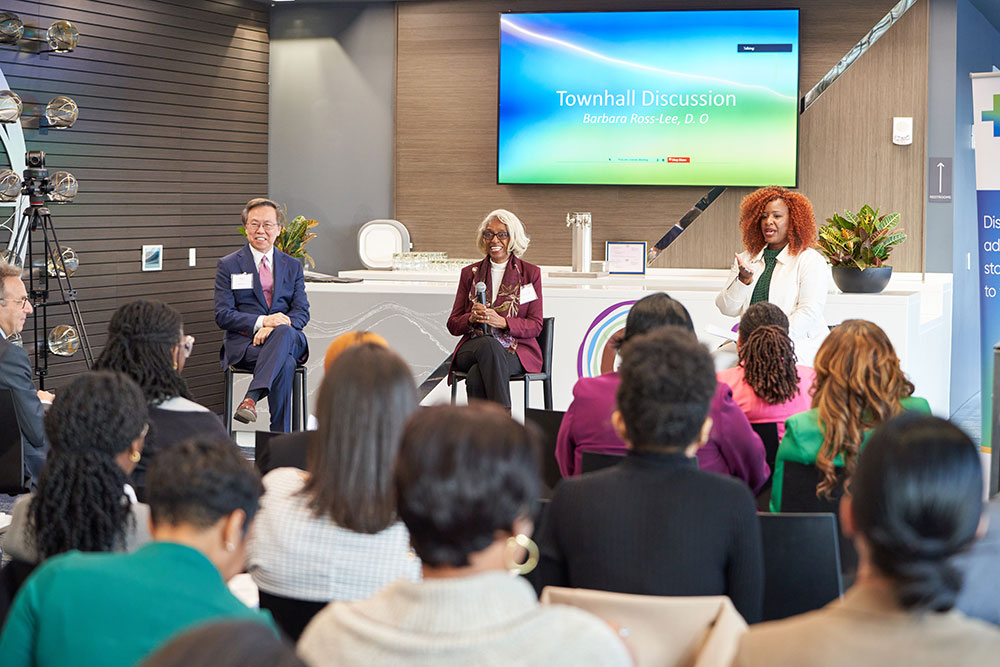Nationally Renowned Speaker Advises Henry Ford + MSU to Create Change and Value

Henry Ford Health + Michigan State University Health Sciences continues to embed diversity, equity, inclusion, and justice (DEIJ) throughout the partnership by hosting the second Henry Ford + MSU DEIJ Speaker Series. The October 19 event was nearly full at the Pistons Performance Center of MSU and Henry Ford members who had come to hear from nationally recognized health policy expert, Barbara Ross-Lee, D.O.
"Our purpose here is to bring in the leaders within the system, both Henry Ford as well as MSU, to be able to think about the issue of diversity, equity, inclusion and justice,” said Henry Lim, M.D., DEIJ vice chair and Henry Ford Health senior vice president of academic programs. "Then we all can go back to our home bases to impact the changes on the organization, which would eventually lead to culture change."
Ross-Lee has served as an advisor for state and federal governments on primary care, medical education, and healthcare issues. An alumni of the MSU College of Osteopathic Medicine, she was elected the first African-American woman dean of a U.S. medical school.

“In short, Dr. Barbara Ross-Lee is an absolute icon,” said Marita Gilbert, Ph.D., Henry Ford + MSU DEIJ committee chair and MSU College of Osteopathic Medicine associate dean of Diversity and Campus Inclusion. “I am grateful for her making a way for me and for so many of others.”
Before the community dialogue, Ross-Lee shared her top 12 life lessons ranging from understanding the importance of words and how overutilized words lose their original intent and take on personal interpretations, to learning how to reframe diversity, equity and inclusion.
“Diversity is not about numbers. It's about achieving excellence. You can't have excellence without diverse perspectives,” said Ross-Lee. “If you reframe diversity people won't talk about the numbers. The momentum will be toward achieving excellence.”
This discussion on reframing the language continued throughout the community dialogue and was part of the core message of creating change and value in health professions for underrepresented populations.

“If medicine doesn't recognize human value, what other profession can or will?” said Ross-Lee.
Creating the change and value, however, does not come without obstacles as multiple audience members asked Ross-Lee on how to stay resilient and overcome the barriers.
“There's more than one way of achieving a change and organizational structures are change averse,” explained Ross-Lee. “The fact that you want to make a change and you run into a brick wall, should not be a surprise. The challenge of change is to be able to figure out a way to get around that brick wall.”
Ross-Lee's words of wisdom resonated with many in the room. Several of the attendees also appreciated the open dialogue format, which allowed for various questions and perspectives to be shared.
“Ironically this work can be isolating,” said Dr. Renée Branch Canady, CEO of Michigan Public Health Institute (MPHI). “A lot of people don't want to talk about it, and to hear from someone like Dr. Ross Lee, who's been committed to talking about it for over half a century, literally helps me feel like I can keep going.”

Canady is also the author of the recently published book, Room at the Table: A Leader's Guide to Advancing Health Equity and Inclusion. In her book, Canady shares through research and candid stories what it’s like to be on the front lines as an equity public health leader. In-person event participants had the chance to receive a copy of the book and the opportunity to have a copy signed by Canady.
“We chose this book very intentionally, not just because Dr. Canady is an alum of Michigan State University,” said Gilbert. “But she's also an exemplar of excellence in connecting DEIJ and health science in her work here in the state of Michigan.”
A key element of Henry Ford + MSU DEIJ efforts is workforce development. This includes a strong commitment to training diverse future physicians, nurses, and other healthcare providers who can meet Michigan’s 21st Century health care needs.
“We will collectively reflect on this reframing narrative to make it actionable and really cultivate it within Henry Ford + MSU,” said Gilbert. “As a partnership we need to consider across our different perspectives and experiences on education and training to really make diversity, equity and inclusion and justice actionable.”
Ross-Lee spoke on how action is not only identifying the problem but also taking the next step to motivating people to resolve the problem.
As Ross-Lee shared in her last life lesson, “new strategies are required to solve old problems.”
Learn more about Ross-Lee's top 12 life lessons, and how to create change and value in the complete community dialogue video at the Henry Ford + MSU YouTube.
